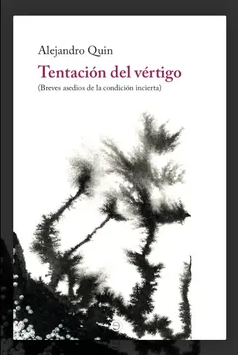Bogotá: Nueve Editores. 2023. 95 pages.
 Tentación del vértigo (Breves asedios de la condición incierta), a compact new book of aphorisms by Alejandro Quin, poses a question about how an experience of uncertainty that powerfully defines our contemporary life relates to the doubt defining eras past. This question of epochal doubt, highlighted in introductory remarks describing the book as a document of the author’s decision to open himself to the plenitude of his uncertainty, is one of the important questions of our time. Quin’s work is an insightful and valuable contribution to its discussion.
Tentación del vértigo (Breves asedios de la condición incierta), a compact new book of aphorisms by Alejandro Quin, poses a question about how an experience of uncertainty that powerfully defines our contemporary life relates to the doubt defining eras past. This question of epochal doubt, highlighted in introductory remarks describing the book as a document of the author’s decision to open himself to the plenitude of his uncertainty, is one of the important questions of our time. Quin’s work is an insightful and valuable contribution to its discussion.
Tentación del vértigo establishes many affinities with the past, not least of which is the very fact that it is a book of aphorisms—a genre that might be seen as anachronistic. More specifically, Quin strikes up conversation with various writers of aphorism and fragment, but perhaps the most significant dialogue can be found in his above-mentioned articulation of the value of being haunted by doubt, by which he simultaneously draws up to and sets himself apart from the pioneer of modern uncertainty, René Descartes. A key aphorism reads: “Cómo método hacedor del mundo, el cartesianismo ultrajó la duda al convertirla en camino a las certezas” [“As a method for creating the world, Cartesianism defamed doubt by converting it into a path to certainty”]. While Quin differentiates himself from Descartes, seeming principally to want to cultivate the creative potency of doubt rather than eradicate it, there is a tension here. After all, the aphorism, especially insofar as it can double as maxim, is a medium tailored to the telling of pithy truths. If he is truly at peace with his doubt, why, for presenting these meditations, would he so precisely select a medium which, in spite of everything, creates little stones of certainty? The book must be read as an exploration of this irony and others of its kind, as the contradictions and tensions that drive thought onward.
In regard to the genre of the work itself, for example, one must ask: after postmodernism, Derridean deconstruction, the invalidation of the master narrative, and the foundering of romantic visions of genius, what power is left for a book of aphorisms to claim for itself? History has dictated that Quin cannot assume the authority that has been ascribed to other writers of aphorism and fragment—to Gracián, Nietzsche, Kafka, or Adorno. And all too aware of these developments, he does not dream of doing so. Indeed, he rejects the certainty such authority was meant to bestow. Yet one discovers that in this seemingly invalidated and obsolete medium something continues to spring forth. The aphorism’s play of contradiction and negation appears to contain a prototypical deconstructive force. Quin’s decision to write such a book is as improbable as it is original: an uncanny repetition of something that was supposed to no longer be replicable, Menard-like in only the best way.
“WHILE THE BOOK IS SERIOUS IN ITS INTELLECTUAL AMBITION, ITS SUBJECTIVIST APPROACH ALLOWS IT TO BE PLAYFUL AS WELL”
Well informed, characterized by distinguished erudition, but personal in the same way Nietzsche’s writing was personal, Tentación del vértigo is an intellectual memoir, which, stripped of biographical narrative, becomes both more forceful and more airy than a traditional memoir. And although Quin is a professor, the book documents a life of the mind whose scope extends beyond the academy. One positive consequence is that it is relatively accessible and readable. As an academic myself, I felt an urgency at times to know exactly which texts Quin responds to with each aphorism. In lieu of footnotes, the book includes an appendix, “Dialogantes” or “Interlocutors,” listing the philosophical, literary, and musical texts (not to mention cities and events) with which he engages. This list provides a useful key for decoding the specifics contained in what can be seen as a synchronic map or constellation of an intellectual trajectory and ethos.
While the book is serious in its intellectual ambition, its subjectivist approach allows it to be playful as well. It is marked by an aesthetic that is characteristic of a generational sensibility found elsewhere in the works such as Richard Linklater’s Slacker and Jim Jarmusch’s Coffee and Cigarettes. It is a sensibility that is critical of triumph while at the same time caring about intelligence: a sensibility characterized by the paradox of liking sad music, in solidarity with the vanquished, and refusing to relinquish a certain negativity. Along these lines, Quin’s intellectual concerns are consistently linked to questions of ethics. We find in Tentación an intimate confrontation with an experience of a doubt that cannot be separated from what has been elsewhere described as the death of God—an absence not merely of intellectual, but also moral certainty. Starting from this vantage point, it strikes out its own path through the darkness and discovers, if not certainties, judgments, affirmations, criticisms, and perhaps truths.





